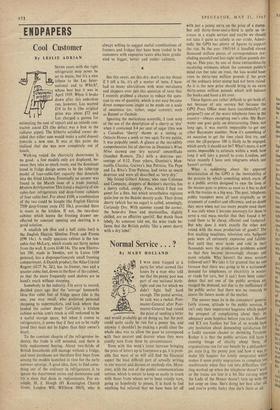Normal Service . . . ?
By MA RY HOLLAND
Even with this week's latest increase bringing the price of letters up to fourpence a go, it is prob- able that most of us will still find the financial aspect the least difficult part of actually writing to our nearest and dearest or anybody else. More- over, with the rest of the public communications service, which is meant to keep us easily in touch with those from whom we've beeti cruelly torn, going so hopelessly to pieces, it is hard to feel anything but relieved that we have been let off
with just a penny extra on the price of a stamp. But still thirty-three-and-a-third is quite an in- crease in a staple service and maybe we should not take it quite so calmly in our stride. Admit- tedly the GPO has plenty of figures to support the rise. In the year 1963/64 it handled eleven thousand million pieces of correspondence (ex- cluding parcels)'and lost eight million pounds do- ing so. This year, by one of those extraordinarily escalating estimates which the common public's mind can but take on trust, the loss would have risen to thirty-two million pounds if the price of the ordinary letter stamp had not been raised. As it is the new price should bring in an extra thirty-seven million pounds which will balance the books and leave a bit over.
These figures are rather difficult to get hold of, not because of any secrecy but because the GPO Press Office must have (accidentally? on purpose?) one of the worst telephone lines in the country—always excepting one's own. My Bays- water one goes gaily on deteriorating. Once, not long ago, it was merely impossible to get any other Bayswater number. Now it's something of an occasion to get the time clock first try, and even the all-purpose 100 is likely to be engaged, which surely it should not be? What's more, it now seems impossible to estimate within a week how long it will take a parcel to cross London, and twice recently I have sent telegrams which just haven't arrived.
What is saddening about the apparent deterioration of the GPO is the inevitability of the process by which something which starts off as a public service designed to ease the lives of the masses goes to pieces as soon as it has to deal with the masses in a big way. The post, telephone. public transport were all seen originally as in- struments of comfort and efficiency, and no doubt they were when not too many people used them. It was only when it became necessary for them to serve a real mass market that they found it be yond them to be cheap, efficient and foolproof. But why does it work exactly the other way rotmd with the mass production of goods? The first washing machines, television sets, ballpoint pens were all extremely expensive and fallible. Not until they were made and sold in their thousands were the production problems solved so that they became increasingly cheaper and more reliable. Why haven't the mass services followed suit? We take it for granted that no one foresaw that there was going to be a nationwide demand for telephones, or electricity in winter, or roads for cars, but it can't have been coinev dence that not one of the public services en- visaged the demand, nor due to the inefficiency of the public sector that there was no research to assess the future needs of the market.
The answer must lie in the consumers' general, fairly craven, attitude to the public services. It isn't only their impersonal hugeness which makes the prospect of complaining about their kr adequacy seem hopeless before you start. Hoover and ICI are faceless but few of us would have any hesitation about demanding satisfaction for a faulty vacuum cleaner or shrinking Terylene. Rather it is that the public services still have 3 cunning image of charity about them, of organisations run for our benefit by a philanthro- pic state (e.g. the penny post and how it was to make life happier for lonely emigrants) which makes it seem pretty ungracious to complain too vociferously when they run into difficulties. Get' ting worked up when the telephone'doesn't work or the trains are late is a bit like cursing what the Lady of the Manor doesn't turn up with the hat soup on time. She's doing her best after all' and you're pretty lucky that she's there at all•






























 Previous page
Previous page